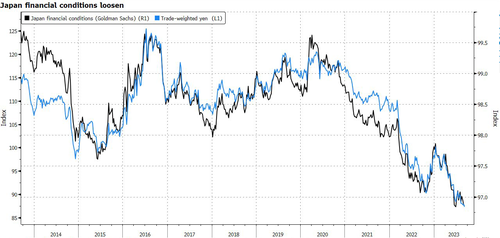
By Robert Fullem, Bloomberg Markets Live reporter and strategist
Yen alarm bells are quiet. Maybe they should be ringing loudly.
Ministry officials this week warned about yen weakness several times, including Finance Minister Shunichi Suzuki on Friday. His comments follow those of Bank of Japan Board Member Junko Nakagawa on Thursday who said the central bank will closely coordinate with the government in monitoring foreign-exchange rates and their impact on the economy.
The timing of the comments is interesting since they precede a G-20 leaders summit and a Bank for International Settlements meeting of central bankers in Switzerland next week, possible venues to discuss currency policy with those outside Japan.
So the Fed never counted on Biden's Dept of Commerce, Labor, Census Bureau, etc, coming up with the most creative seasonal adjustments in history and making the economy "grow" at 5.8%, so EMs (and DMs) are about to croak
— zerohedge (@zerohedge) August 17, 2023
Time for an emergency CB session at Centralbahnplatz 2
The circumstances may be right for the Bank of Japan, rather the government, to address yen weakness. Core inflation is historically high and the yen weak. While Q2 GDP was revised down Friday, Cabinet Office figures show overall demand in the economy has started to outstrip supply.
One concern for Bank of Japan Governor Kazuo Ueda is the recent slowdown in money-supply growth. But monetary conditions in Japan are sufficiently easy to add a dose of tightening.
There are some signs that consumption may start to become self sustaining. Credit card use, department store sales and internet services are trending up. Moreover, Japanese equity and property prices are rising, a potential buffer for consumers down the road. Levels of equity volatility have remained subdued since April when Warren Buffett said he planned to boost investments in Japan and Ueda signaled there would be no significant policy changes.
Currency markets are pricing in volatility of 10% over the Fed and Bank of Japan meetings in a couple weeks. This seems low given that the average over the past 10 years if about 8.5%.
By Robert Fullem, Bloomberg Markets Live reporter and strategist
Yen alarm bells are quiet. Maybe they should be ringing loudly.
Ministry officials this week warned about yen weakness several times, including Finance Minister Shunichi Suzuki on Friday. His comments follow those of Bank of Japan Board Member Junko Nakagawa on Thursday who said the central bank will closely coordinate with the government in monitoring foreign-exchange rates and their impact on the economy.
The timing of the comments is interesting since they precede a G-20 leaders summit and a Bank for International Settlements meeting of central bankers in Switzerland next week, possible venues to discuss currency policy with those outside Japan.
So the Fed never counted on Biden’s Dept of Commerce, Labor, Census Bureau, etc, coming up with the most creative seasonal adjustments in history and making the economy “grow” at 5.8%, so EMs (and DMs) are about to croak
Time for an emergency CB session at Centralbahnplatz 2
— zerohedge (@zerohedge) August 17, 2023
The circumstances may be right for the Bank of Japan, rather the government, to address yen weakness. Core inflation is historically high and the yen weak. While Q2 GDP was revised down Friday, Cabinet Office figures show overall demand in the economy has started to outstrip supply.
One concern for Bank of Japan Governor Kazuo Ueda is the recent slowdown in money-supply growth. But monetary conditions in Japan are sufficiently easy to add a dose of tightening.
There are some signs that consumption may start to become self sustaining. Credit card use, department store sales and internet services are trending up. Moreover, Japanese equity and property prices are rising, a potential buffer for consumers down the road. Levels of equity volatility have remained subdued since April when Warren Buffett said he planned to boost investments in Japan and Ueda signaled there would be no significant policy changes.
Currency markets are pricing in volatility of 10% over the Fed and Bank of Japan meetings in a couple weeks. This seems low given that the average over the past 10 years if about 8.5%.
Loading…





